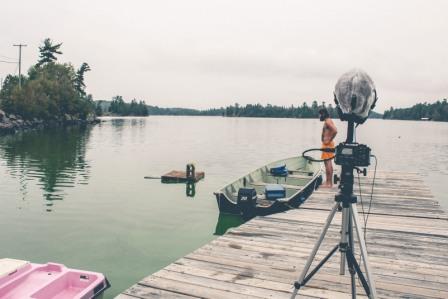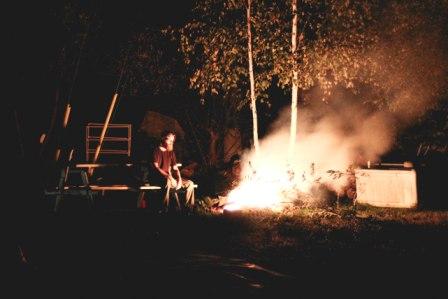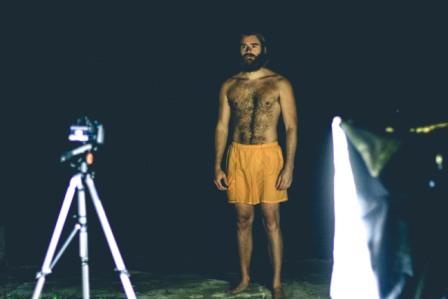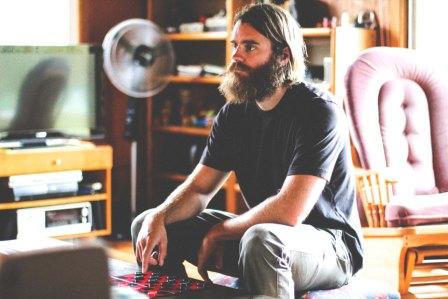Daniel Robinson, last year’s recipient of the Jane Graham Memorial Award, is the embodiment of Nestor, a 62-minute film that he created entirely alone, filling all roles from pre-production, filming, to post. The synopsis of Nestor on its IMDb page describes the film as following the struggle of ‘a man who has awoken alone in a remote, abandoned village. With only vague memories of his surroundings, the man relies on his instincts and creativity to discover his purpose and survive the crippling isolation.’
Stemming from a life-long mission to create a feature-length film, the practical constraints that Robinson faced in making his goal a reality shaped the vision for Nestor. “Knowing that I was going to do something very small, I just decided to do it as small as possible and do it by myself where I’m very comfortable,” Robinson explained. “I knew I could work alone for as long as I needed to. And the genesis of the story just kind of took off from there.”
Without much need for a traditional script (there is almost no dialogue in the film), Robinson began with an outline for scenes. He continued to develop and uncover story elements as he made and edited the film. The result is a quiet but complex work that Robinson refers to as his “little film.”
Creating the film constantly tested Robinson’s knowledge, skill, and equipment. Doing things alone meant taking on “all the little jobs that come with filmmaking,” while using only “rudimentary equipment” to create the work. While overcoming the learning curve, he noted, “The filming of it was easier than most things. The hardest was sound. Sound is extremely hard. Even when you have a crew, doing sound properly is very, very difficult. So I had to really test the limits of my knowledge to get good sound on each individual scene.” For Nestor, trial and error was part of Robinson’s process.
The work was filmed near Nestor Falls, which gave the film its name. The township in Northern Ontario holds a special significance for Robinson, who spent his summers and weekends there at the family cottage growing up. His familiarity and connection with the area is potent. He notes, “So much of the film was influenced by the location. The film doesn’t exist without the town, without that location, without that cabin and just having nothing but solitude that whole time. It wouldn’t work. So the location of Nestor is paramount, and I couldn’t have shot it anywhere else.”
While Nestor was born, in some part, from Robinson’s character and tendency towards solitude, he is not as hermit-like as the character in the film. Unlike his character, Robinson is deeply connected to the community in Guelph and felt this connection had a major role to play in the creation of the film. He says, “Guelph is just a great place to work. It provides enough culture that it keeps my brain stimulated, but it’s small enough that I don’t feel overwhelmed by being in a big city. When I finished Nestor, I came back to Guelph, where I live, and edited it here.”

Robinson has shown Nestor at several film festivals, most notably at the Whistler Film Festival, which his Jane Graham Memorial Award allowed him to attend. When asked about his experience at the festival Robinson noted, “It was great. From top to bottom it was such a great experience. It went off without a hitch. We had two screenings of the film with great feedback afterward. People were very interested, mostly in the back-story. How it was that I was able to do it all. I think people liked the movie. There were a few reviews that came out of the festival that were very positive… I would say the whole festival was a big confidence boost because it’s a big deal and the fact that they chose my little movie, and people responded well to it and bought tickets for it. I was walking around with a smile on my face the whole time.”
When asked about seeing his film on the big screen Robinson noted it was “nauseating” but also, “Profoundly different. When you see it in a venue that it’s designed for, you can really appreciate the work that you’ve put in, and you can really see all the glaring holes in the things that you’ve missed.”

The Award was created in honour of visual artist Jane Graham, who lived and worked in the Guelph area for many years before her death early in 2005. Working closely with the Graham family, Guelph Arts Council established a fund with donations made in memory of the beloved and respected local artist. The fund is managed by The Guelph Community Foundation. Guelph Arts Council offers the award to support visual artists who are actively practicing in Guelph or Wellington County and wish to pursue opportunities that will contribute to their artistic growth.
Robinson shared that, “Financially, there was no budget for this movie. So any kind of help was just a real blessing…We went to the film festival knowing that we were in good hands, and the people in Guelph were supporting us. And it made the experience that much more pleasant knowing that the people of Guelph and the Arts Council saw something in my project and said ‘we want you to see this thing through and if we can help you we will.’ I was blown away when the award came my way. I felt very supported financially and emotionally.”

The 2016 application deadline for the Jane Graham Memorial Award is Friday, September 30 at 4 pm. Any visual artist residing and actively practising in Guelph or Wellington County is encouraged to apply for opportunities that will be pursued after November 15, 2016. The award’s terms of reference and application instructions are posted here. The award(s) will be announced in late fall 2016.
To apply for the Jane Graham Memorial Award click here: https://form.jotform.com/52674521198966
For more information on Nestor and Daniel Robinson click here: https://vimeo.com/91763662 or http://www.nestormovie.com/








